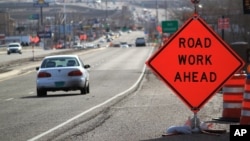President Donald Trump's $1 trillion infrastructure plan will likely include private projects like pipelines that don't involve federal money but have been hindered by a lack of government permits or regulations, according to a key Republican lawmaker.
Trump has repeatedly pledged, including in his speech Tuesday to Congress, to seek $1 trillion in public and private funds to improve America's infrastructure and create jobs. But he hasn't provided specifics about where the money would come from or when it would be spent. Senate Majority Leader Mitch McConnell and other Republican leaders have indicated they don't want to add substantially to the federal deficit.
“It's not going to be $1 trillion coming out of Washington, D.C.,” said Rep. Bill Shuster, chairman of the House Transportation and Infrastructure Committee. The Pennsylvania lawmaker said he was part of small groups of people that met twice with Trump at the White House recently on the matter.
“Let me say something about where some of these other dollars are going to come from: There are billions and billions of dollars out there today, private sector dollars, that are going to be spent,” Shuster told a conference of state transportation officials. He cited two pipeline projects in Pennsylvania and one in Florida as examples.
The Army Corps of Engineers and other government agencies “are holding up these projects,” Shuster said. “If the corps signs off, and we get a couple of other people in agreement, we're talking about $4 billion just in Pennsylvania and a couple of other states that can be done.” He identified the Pennsylvania projects as the Constitution and the Atlantic Sunrise pipelines. He didn't identify the Florida project, but said it would cost about $1.5 billion.
Rep. Peter DeFazio of California, the senior Democrat on the transportation committee, said private investment in infrastructure projects like pipelines and freight railroads shouldn't count toward Trump's $1 trillion commitment because those industries already plan to spend that money.
The infrastructure plan should be “new, needed investments in the public infrastructure.” he said.
Transportation Secretary Elaine Chao has said the administration wants to “unleash the potential” of private sector investors in highway and other projects, but investors are typically interested only in projects that have a revenue stream like tolls to make them profitable. There are relatively few large transportation projects like that in the U.S., according to lawmakers and transportation industry officials.
Other possibilities for raising the money - increasing the federal gas tax, imposing a tax on miles driven, and charging tolls on federal interstate highways - are all likely to generate opposition.
Lawmaker Says Trump Infrastructure Plan Not All Government Money




